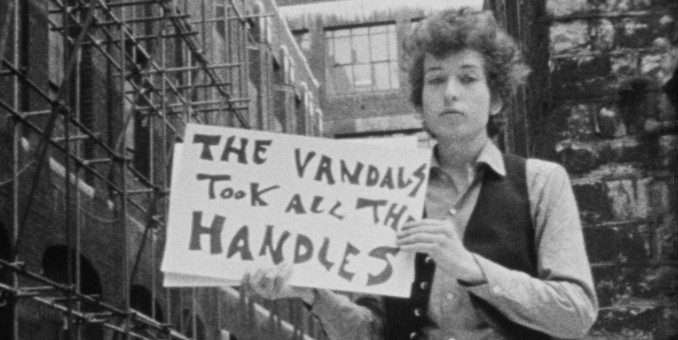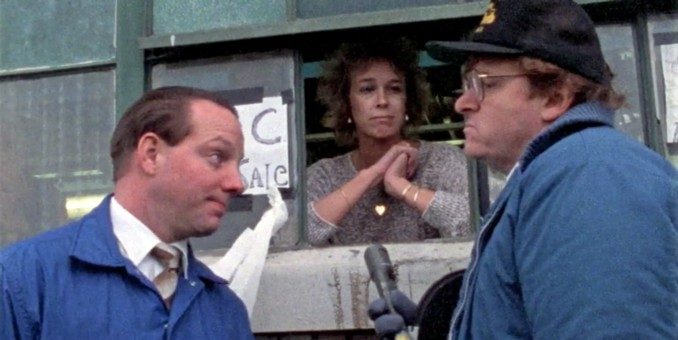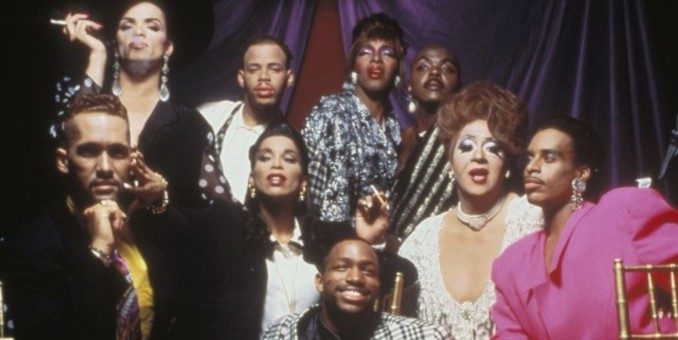 Insanity has been defined as doing the same thing over and over again and expecting a different result. This Oscar’s Greatest Mistakes is kind of like that. It’s their mind-boggling failure to award the best documentaries in the Best Documentary Feature category, which happens almost every year. What’s insane is that they constantly ignore worthy films over and over again and expect people who know movies to take the category seriously.
Insanity has been defined as doing the same thing over and over again and expecting a different result. This Oscar’s Greatest Mistakes is kind of like that. It’s their mind-boggling failure to award the best documentaries in the Best Documentary Feature category, which happens almost every year. What’s insane is that they constantly ignore worthy films over and over again and expect people who know movies to take the category seriously.
The constant blundering in the category is now legendary. The amount of memorable documentaries that have failed to even be nominated, let alone win an Oscar, is astounding. Every article of the sort gives you a list of the snubbed, and so will I, but I will attempt to explain why these films that stayed in the global consciousness deserved to get the Academy’s recognition. And I’ll also show you that calling these omissions mistakes is misleading. Because these omissions were deliberate.
The Up Series (1964,1970,1977,1984,1991,1998,2005,2012)

Michael Apted’s Up Series brilliant look at British class structure starting with a group of seven year-old kids and revisiting them every seven years to see how they grew, matured and spent their lives. It is an unprecedented display in endurance–the next installment is set to start filming this year–and a stunning way to show how class advantages or disadvantages affect people. Roger Ebert called the series “an inspired, even noble, use of the film medium”, that the films “penetrate to the central mystery of life”, and 28 up was named to BFI’s list of the 100 Greatest British Television Programmes but to date, none of the installments have been nominated for an Oscar.
Dont Look Back (1967)
 That picture up there, taken from “Suburban Homesick Blues” sequence that opened the documentary, which was parodied by everyone from INXS to Weird Al Yankovic to Bob Roberts, is only the tip of the iceberg of this film’s influence. D.A. Pennebaker’s no holds barred, all-access look at Dylan on his 1965 U.K. Tour showed Dylan warts and all–arguing with reporters, mocking fellow artists and the dissolution of his romance with Joan Baez–and set the stage for every rock ‘n roll documentary that followed. Rolling Stone named it the number one greatest rock documentary of all time and the film was added to the United States National Film Registry by the Library of Congress in 1998. It did not get an Oscar nomination.
That picture up there, taken from “Suburban Homesick Blues” sequence that opened the documentary, which was parodied by everyone from INXS to Weird Al Yankovic to Bob Roberts, is only the tip of the iceberg of this film’s influence. D.A. Pennebaker’s no holds barred, all-access look at Dylan on his 1965 U.K. Tour showed Dylan warts and all–arguing with reporters, mocking fellow artists and the dissolution of his romance with Joan Baez–and set the stage for every rock ‘n roll documentary that followed. Rolling Stone named it the number one greatest rock documentary of all time and the film was added to the United States National Film Registry by the Library of Congress in 1998. It did not get an Oscar nomination.
Salesman (1969)

David and Albert Mayles ‘direct cinema” documentary about traveling bible salesmen revolutionized the documentary film making process. Made on a low budget and distributed to by the Mayles brothers themselves, the film ended up on Gene Siskel’s Top Ten list for 1969. In 1992, Salesman was selected for preservation in the United States National Film Registry by the Library of Congress as being “culturally, historically, or aesthetically significant.” It was not nominated for an Oscar.
Gimme Shelter (1970)
 The Mayles brothers return with a concert documentary documenting the final weeks of the Rolling Stones 1969 U.S. tour. The film captures the band’s controversial free concert at the Altamont Speedway where a concertgoer was stabbed by a Hell’s Angel that the Rolling Stones were using as security. The film is referred to as a document to the death of the peace and love generation. The brothers actually captured the stabbing on camera, and the footage was subpoenaed for the murder trial. The film that was the cultural tombstone for the sixties was not nominated for an Oscar.
The Mayles brothers return with a concert documentary documenting the final weeks of the Rolling Stones 1969 U.S. tour. The film captures the band’s controversial free concert at the Altamont Speedway where a concertgoer was stabbed by a Hell’s Angel that the Rolling Stones were using as security. The film is referred to as a document to the death of the peace and love generation. The brothers actually captured the stabbing on camera, and the footage was subpoenaed for the murder trial. The film that was the cultural tombstone for the sixties was not nominated for an Oscar.
Grey Gardens (1975)

The Mayles brothers return once again with another masterpiece that was not recognized by the Academy. The brothers detailed the lives of Edith Ewing Bouvier Beale, known as “Big Edie”, and her daughter Edith Bouvier Beale, known as “Little Edie”, were the eccentric aunt and the first cousin, respectively, of former US First Lady Jacqueline Kennedy Onassis. In 2010 the film was selected by the Library of Congress for preservation in the United States National Film Registry as being “culturally, historically, or aesthetically significant”. In 2017, Grey Gardens tied for ninth in a Sight and Sound film critics poll of best documentary films of all time. It was not nominated for an Oscar. Only one of the Mayles brothers’ documentaries were (1974’s Christo’s Valley Curtain).
Shoah (1985)
 Clocking in at a whopping 9 hours ad 26 minutes, Claude Lanzmann’s examination of the Holocaust is considered a masterpiece to many people to day. It ranked number two in that 2014 Sight and Sound poll mentioned above. Time Out and The Guardian named it the best documentary of all time. It won the New York Film Critics Circle Award for Best Non-Fiction Film in 1985, a special citation at the 1985 Los Angeles Film Critics Association Awards, and the BAFTA Award for Best Documentary in 1986. That year it also won the National Society of Film Critics Award for Best Non-Fiction Film and Best Documentary at the International Documentary Association. With all those accolades, it’s lack of an Oscar nomination seems the most egregious.
Clocking in at a whopping 9 hours ad 26 minutes, Claude Lanzmann’s examination of the Holocaust is considered a masterpiece to many people to day. It ranked number two in that 2014 Sight and Sound poll mentioned above. Time Out and The Guardian named it the best documentary of all time. It won the New York Film Critics Circle Award for Best Non-Fiction Film in 1985, a special citation at the 1985 Los Angeles Film Critics Association Awards, and the BAFTA Award for Best Documentary in 1986. That year it also won the National Society of Film Critics Award for Best Non-Fiction Film and Best Documentary at the International Documentary Association. With all those accolades, it’s lack of an Oscar nomination seems the most egregious.
The Thin Blue Line (1988)
 Errol Morris’ examination of a Texas man on death row for a murder he did not commit revolutionized the art of documentary film making forever. His use of dramatic recreation of the events he was documenting is a practice that is still in use today. In that 2014 Sight and Sound poll, film critics voted The Thin Blue Line the fifth best documentary film of all time. The film won Best Documentary honors from the New York Film Critics Circle, the Kansas City Film Critics Circle, the National Board of Review, and the National Society of Film Critics. In 2001, the film was selected for preservation in the United States National Film Registry by the Library of Congress as being “culturally, historically, or aesthetically significant.” It did not receive an Oscar nomination.
Errol Morris’ examination of a Texas man on death row for a murder he did not commit revolutionized the art of documentary film making forever. His use of dramatic recreation of the events he was documenting is a practice that is still in use today. In that 2014 Sight and Sound poll, film critics voted The Thin Blue Line the fifth best documentary film of all time. The film won Best Documentary honors from the New York Film Critics Circle, the Kansas City Film Critics Circle, the National Board of Review, and the National Society of Film Critics. In 2001, the film was selected for preservation in the United States National Film Registry by the Library of Congress as being “culturally, historically, or aesthetically significant.” It did not receive an Oscar nomination.
Roger & Me (1989)
 This is the film that introduced Michael Moore to an unsuspecting world. The film details the closing of a number of GM plants in Moore’s hometown of Flint, Michigan and the effect that it had on the town. The film won Best Documentary from the National Board of Review, it ranked number 37 in the 2014 Sight and Sound poll mentioned above. And in 2013, the film was selected for preservation in the United States National Film Registry by the Library of Congress as being “culturally, historically or aesthetically significant.” It was the first film of Moore’s to be snubbed by Academy, but it wouldn’t be the last.
This is the film that introduced Michael Moore to an unsuspecting world. The film details the closing of a number of GM plants in Moore’s hometown of Flint, Michigan and the effect that it had on the town. The film won Best Documentary from the National Board of Review, it ranked number 37 in the 2014 Sight and Sound poll mentioned above. And in 2013, the film was selected for preservation in the United States National Film Registry by the Library of Congress as being “culturally, historically or aesthetically significant.” It was the first film of Moore’s to be snubbed by Academy, but it wouldn’t be the last.
Paris Is Burning (1990)
 On the surface, the film was a study of the ball and voguing culture of the late 1980s. But where the film really excels is as a window into the gay and drag subcultures in NYC during the AIDS era. The film won several awards including a Sundance Film Festival Grand Jury Prize, a Berlin International Film Festival Teddy Bear,an audience award from the Toronto International Film Festival, a GLAAD Media Award, a Women in Film Crystal Award, and a Best Documentary award from the Los Angeles, New York, and National Film Critics’ Circles. In 2016, the film was selected for preservation in the United States National Film Registry by the Library of Congress as being “culturally, historically, or aesthetically significant.” It’s lack of a Oscar nomination was blamed on the Academy not being willing to take risks in nominating provocative subjects.
On the surface, the film was a study of the ball and voguing culture of the late 1980s. But where the film really excels is as a window into the gay and drag subcultures in NYC during the AIDS era. The film won several awards including a Sundance Film Festival Grand Jury Prize, a Berlin International Film Festival Teddy Bear,an audience award from the Toronto International Film Festival, a GLAAD Media Award, a Women in Film Crystal Award, and a Best Documentary award from the Los Angeles, New York, and National Film Critics’ Circles. In 2016, the film was selected for preservation in the United States National Film Registry by the Library of Congress as being “culturally, historically, or aesthetically significant.” It’s lack of a Oscar nomination was blamed on the Academy not being willing to take risks in nominating provocative subjects.
Hoop Dreams (1994)
 Hoop Dreams, the story of two, African-American children in Chicago trying to become basketball stars, is widely considered the best documentary of all time. Roger Ebert called it the best film of the decade. The film was ranked #1 on the International Documentary Association’s Top 25 Documentaries list, based on polling of members in 2007. It won the audience award at the Sundance Film Festival. It also won a Peabody Award and won Best Documentary from the Los Angeles Film Critics Association, the New York Film Critics Circle, and the National Society of Film Critics. The film did receive an Oscar nomination—for Best Editing. But not one for Best Documentary.
Hoop Dreams, the story of two, African-American children in Chicago trying to become basketball stars, is widely considered the best documentary of all time. Roger Ebert called it the best film of the decade. The film was ranked #1 on the International Documentary Association’s Top 25 Documentaries list, based on polling of members in 2007. It won the audience award at the Sundance Film Festival. It also won a Peabody Award and won Best Documentary from the Los Angeles Film Critics Association, the New York Film Critics Circle, and the National Society of Film Critics. The film did receive an Oscar nomination—for Best Editing. But not one for Best Documentary.
Crumb (1994/1995)
 1994 had two stand-out documentaries released in that year. This film was the second. Terry Zwigoff’s in-depth study of underground cartoonist Robert Crumb and his brothers covers his career and his family life. The film hit the festival circuit in 1994 before receiving a theatrical release in 1995. Gene Siskel named the film his best film of 1995. The film also won Best Documentary from the Boston Film Critics, Los Angeles Film Critics, New York Film Critics and National Board of Review. It not get an Oscar nomination.
1994 had two stand-out documentaries released in that year. This film was the second. Terry Zwigoff’s in-depth study of underground cartoonist Robert Crumb and his brothers covers his career and his family life. The film hit the festival circuit in 1994 before receiving a theatrical release in 1995. Gene Siskel named the film his best film of 1995. The film also won Best Documentary from the Boston Film Critics, Los Angeles Film Critics, New York Film Critics and National Board of Review. It not get an Oscar nomination.
The snub of Hoop Dreams and, to a lesser extent, Crumb by the Oscars caused outrage among film fans, producers and film critics. The controversy shined a light on how the films were selected for Oscar consideration. Roger Ebert discovered that some documentary screenings didn’t even get the chance to go through a complete showing. “We learned, through very reliable sources, that the members of the committee had a system. They carried little flashlights. When one gave up on a film, he waved a light on the screen. When a majority of flashlights had voted, the film was switched off. “Hoop Dreams” was stopped after 15 minutes.” Some say Crumb made it to 55 minutes.
The Academy executive director Bruce Davis asked for the voting results from 1994 and found out that the fix went far deeper than that. Members were to watch each of the 63 films and rate them on a scale from one to ten. A cabal of viewers gave zeroes to other than the five films they wanted to see nominated, and gave their top five all tens. The result is that the voting was skewed in the overall group towards the five this secret cabal wanted and the films they have decided to shun would not get nominated.
Yes, all the snubs you see above weren’t left off the Oscar ballot by accident or by mistake. The snubs most likely left out deliberately by a group of voters who felt the best documentaries of all time were not worthy for some reason.
The fact that the Best Documentary category had become a shameful laughing stock of the ceremony caused the Academy to make changes in 1995 to ensure that what happened to Hoop Dreams and Crumb wouldn’t happen again. The nominees were more inclusive from then on, but there still were snubs.
Fahrenheit 9/11 (2004)
 Moore’s controversial examination of the presidency of George W. Bush, the war on terror and the Iraq War was the highest grossing documentary of all time. It accomplished the rare feat of winning the Palm D’Or and the Cannes Film Festival and the People’s Choice Award for Best Motion Picture. Its screening at Cannes earned it a 20 minute standing ovation. But it didn’t receive an Oscar nomination. The Academy blamed the snub on the fact that the film aired on television prior to its theatrical release, an excuse that rings hollow considering that didn’t stop them from recognizing 1982’s winner Just a Missing Kid and later years made-for TV documentaries getting nods after a brief theatrical release prior to their TV premiere.
Moore’s controversial examination of the presidency of George W. Bush, the war on terror and the Iraq War was the highest grossing documentary of all time. It accomplished the rare feat of winning the Palm D’Or and the Cannes Film Festival and the People’s Choice Award for Best Motion Picture. Its screening at Cannes earned it a 20 minute standing ovation. But it didn’t receive an Oscar nomination. The Academy blamed the snub on the fact that the film aired on television prior to its theatrical release, an excuse that rings hollow considering that didn’t stop them from recognizing 1982’s winner Just a Missing Kid and later years made-for TV documentaries getting nods after a brief theatrical release prior to their TV premiere.
Grizzly Man (2005)
 Werner Herzog’s biography of Timothy Treadwell, a man who thought of himself as a protector of grizzly bears, became the documentary form of a horror film. Treadwell, after spending 13 summers living among the grizzly bears in the National Parks in southern Alaska, he and his girlfriend were attacked, killed and eaten by a grizzly in 2004. The harrowing tale earned a Best Documentary/Non-Fiction Film Award from the Los Angeles Film Critics Association, the New York Film Critics Circle, the San Francisco Film Critics Circle and the Toronto Film Critics Association. It did not even make the submissions list for an Oscar nomination.
Werner Herzog’s biography of Timothy Treadwell, a man who thought of himself as a protector of grizzly bears, became the documentary form of a horror film. Treadwell, after spending 13 summers living among the grizzly bears in the National Parks in southern Alaska, he and his girlfriend were attacked, killed and eaten by a grizzly in 2004. The harrowing tale earned a Best Documentary/Non-Fiction Film Award from the Los Angeles Film Critics Association, the New York Film Critics Circle, the San Francisco Film Critics Circle and the Toronto Film Critics Association. It did not even make the submissions list for an Oscar nomination.
King of Kong: A Fistful of Quarters (2007)
 This film documents Steve Wiebe and his quest to unseat Billy Mitchell as holder of the highest-score on the video game, Donkey Kong. Filled with drama and intrigue, the film garnered a Best Documentary Award from the North Texas Film Critics Association and appeared on numerous critics Ten Best Films list, It also was left off the submissions list for nomination consideration.
This film documents Steve Wiebe and his quest to unseat Billy Mitchell as holder of the highest-score on the video game, Donkey Kong. Filled with drama and intrigue, the film garnered a Best Documentary Award from the North Texas Film Critics Association and appeared on numerous critics Ten Best Films list, It also was left off the submissions list for nomination consideration.
The history of snubs continues to this very day. Won’t You Be My Neighbor?, the documentary focused on Fred Rogers, widely regarded as one of the best documentaries of all time, let alone of 2018, was ignored by the academy in this year’s nominations.
The Best Documentary category has become such a joke that the award should be abolished. It is at the point where more attention is given to the films that were not nominated than the ones that were. It is no longer trusted by moviegoers as an award that recognizes the skill, artistry and craft. Many people see it as a category where cronyism rules and self-appointed gatekeepers decide to shun quality films to give attention to films they deem deserve more attention. The fact that the category is still being given out is one of Oscar’s biggest mistakes.




